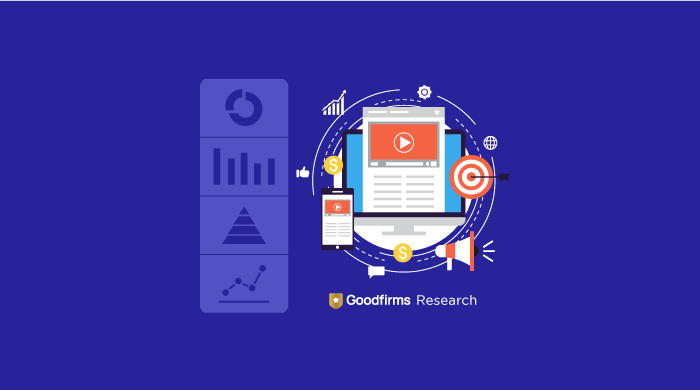ABSTRACT:
Digital advances are paving the way for creative intelligence. Yet, as several sectors are seeing surges of innovation, only a few ideas undergo a well-defined process for bringing the idea into reality. There are several promising ideas that become superficial, narrow, or even perish altogether due to miscommunication, misalignment of the business with IT, and so on. An ideal way to take complete control of transforming your idea into applications without learning to code is by using the best app development software.
Although app development software should be able to capture the scope and reality of the idea collectively and connect it with the level of invention required to push it to the market, there are challenges associated with its usage. A well-defined process for app development relies on terms such as “user-centered,” “Agile,” “lean development,” “originality,” “low-code/no-code,” “AI-enabled,” “scalability,” and so on. So, how do you go about all these to craft workable applications?
In this survey, Goodfirms is attempting to present a guide to app development using app development software. It also aims to gather a few tips, analyze the challenges involved, and predict the future of app development software market.
With a major chunk of application development happening with the help of app development software, businesses should have a clear understanding of the challenges they might face associated with building, hosting, and deploying the applications.
Table of Contents:
Overview of the App Development Software Market
App Development Software Market Size
Factors Driving the Growth of the App Development Software Market Worldwide:
What Factors to Consider When Selecting the App Development Software?
#7 Automation with Prebuilt Templates/ Drag-and-Drop Functionality
What are the Key Benefits of App Development Software?
#11 Better Customer Experience
What are the Key Challenges of Using App Development Software?
- Security Concerns
- Restricted Customizations
- Limited Freedom to Experiment
- Rigid Templates
- Lack of Integration Options
- Scalability Issues
Key Points to Follow to Transform the Business Ideas Into Application:
A few Statements from our Research Partners on App Development Software Utility:
Future of App Development Software
How Much Does it Cost to Develop an App With App Development Software?
Introduction
Mobile apps have become an indispensable part of the digital landscape. They provide a medium for businesses to improve the customer experience. With the rising use of hand-held devices and mobile applications, the demand for developing apps for every business is not a need but a norm today.
While apps have become increasingly common, app development may still be a daunting task. To make the process easier and faster, app development software solutions are an efficient tool for businesses. The advent of app development software has enabled the building and hosting of apps in a convenient and efficient manner. In addition to the benefits, no-code and low-code platforms are gaining immense popularity by allowing businesses to launch their apps even with minimal to no coding knowledge.
The faster development and deployment process has led to the higher adoption of the low-code/no-code application development platforms.
Goodfirms conducted a survey titled ‘Transforming Your Idea into Applications: Challenges, Tips, and Future of App Development Software,’ which presents the factors that are important when selecting an app development software, the benefits, and the challenges of using the software. The survey also attempts to predict the future of app development platforms with emerging technologies,
Overview of the App Development Software Market
The app development software solutions allow businesses to build their apps easily while saving time and money. While the demand for building apps is increasing rapidly, the use of app-building software and tools has gotten a boost in recent years.
App Development Software Market Size
The app development software market size has been growing exponentially for the last few years. The global application development software market is projected to account for USD 179.9 billion in the year 2024. The revenue in the application development software market worldwide is estimated to reach USD 234.70 billion in 2028, with a CAGR of 6.87%.(1)
The major contribution to the market comes from the North American region. Asia Pacific and Europe are also the key markets that lead the app development software market worldwide.
The key players in the app development software market include Appsheet, Github, Zoho Creator, Fujitsu, Wipro, Oracle Corporation, HCL Technologies, and SAP SE, to name a few.
Factors Driving the Growth of the App Development Software Market Worldwide:
The growth of the app development software market is fueled by a number of factors. With more and more businesses investing in app development, the worldwide app development market has exploded in the recent past. Some of the factors that promote the growth of the industry are discussed below:
Technological Advancements
Application development involves a tremendous amount of effort. With the introduction of app development software, the app development process becomes much easier and faster. Moreover, app development software solutions have been evolving consistently owing to technological advancements in the field.
The changing technological trends in app development platforms are responsible for making the app development process more efficient and convenient.
Regulatory Measures
One of the major factors that drives the growth of the app development software market is the supportive government policies and incentives for using app development software. The subsidies and incentives provided by the government to promote the growth of renewable energy projects, in turn, drive the growth of the app development software industry.
Demand
The rise in the demand for enterprise applications has led to the need to deliver mobile apps faster. To meet the higher demand for mobile applications, businesses are adopting app development platforms to reduce the time-to-market of the business apps. The rising demand for mobile applications is, therefore, responsible for promoting the growth of the mobile application development software market.
Survey Data Analysis
With the rising importance of enterprise mobile applications, most businesses are adopting mobile applications to improve their customer experience. Owing to the ease of development and automation of several critical business processes, app development software is gaining popularity.
With the demand for faster app development, low-code/no-code app development platforms are on the rise.
Goodfirms conducted a survey, ‘Transforming Ideas into Applications: Tips, Challenges and Future of App Development Software.’ The survey aims to present the benefits and challenges of adopting app development software. The survey also sheds light on the integration of modern technologies and low-code/no-code development in the future.
The survey asked about 640 businesses about their adoption of the application development software and their experience using it.
Current Adoption of App Development Software: (In Percentage)
When asked about the utilization of app development software, around 62.6% of businesses admitted that they had used the software for developing mobile applications.

Around 13.7% of the respondents said that they are planning to adopt the app development software in the coming future, while 23.7% of the respondents have not yet used the software. Goodfirms believes that those businesses that are yet to consider adopting application development software must surely have an alternative approach to app development.
What Factors to Consider When Selecting the App Development Software?
While the demand for app development software is on the rise, several giants are entering the market with varied options for businesses to choose from. When making the choice for the right app development software, businesses need to consider a few factors. The respondents of the Goodfirms survey revealed some factors that are crucial to be considered when selecting the right app development software for a business.
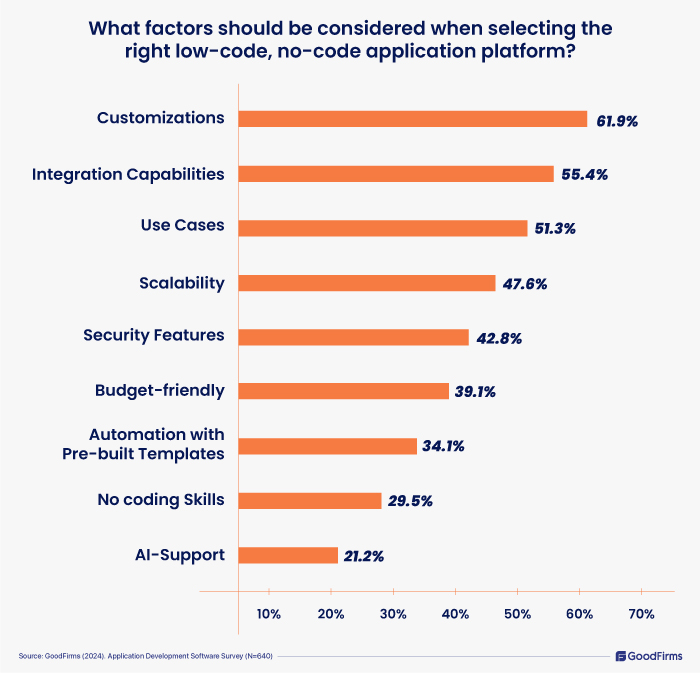
#1 Customizations
61.9% of the survey participants favored customizations as the critical factor when selecting app development software.
Most application development platforms come with templates that allow users to build a mobile app with the required basic functionalities. However, tailoring an app to meet the business requirements often requires some customizations.
According to Diffco, “The future of app development software is set to focus on AI-driven and cloud-native technologies, along with a strong emphasis on custom development solutions that cater to specific business needs.”
An app development software that allows multiple customization options is a good choice for developing an app that is tailored to fit the business needs. Based on the complexity of the application and the features that are required for the final product, the selected software must be able to support the customizations.
#2 Integration Capabilities
About 55.4% of the surveyed businesses indicated that the app development platform should have seamless integration capabilities.
The functioning of a business involves a number of systems that need to be connected. Avoiding the silos among several systems needs the efficient integration of them. Integration of the enterprise systems with the new platform is necessary for maintaining a cohesive digital environment.
Businesses must consider the integration capabilities of the app development platform to ensure that there is a seamless flow of data within the enterprise's digital environment. It is also necessary that businesses check the actions supported after third-party integrations.
#3 Use Cases
Around 51.3% of the surveyed businesses mentioned use cases of the software as a deciding factor when selecting the best app development tool.
While choosing the right app development software, businesses must check for the use cases of the particular software. Although most vendors claim to cater to a large number of industries, there are some software solutions that are suitable for specific niches.
“App development software has a huge potential for eCommerce and will make an easier business strategy for non-technical SME businesses,” said APOM Solutions.
Outlining the goals of the application, having clarity on the specific requirements, and the target audience must all be considered when selecting the right software for a project. Evaluating various options and identifying the possibilities of the software and the challenges will be beneficial when choosing the suitable platform for developing a business application.
#4 Scalability
According to 47.6% of the survey respondents, the scalability of the app development software stands as the prime factor for choosing the right application development software
Scalability is a crucial aspect to consider when selecting app development software. The software solution chosen must be able to accommodate future requirements quickly without any interruptions.
Whatever the use case of the app development software, the project is expected to evolve in the future with changing requirements and rising demand. The investment made for the software at one point should be made, keeping in mind the scalability requirement in the future.
“App development software helps in getting something in front of users at a fraction of the cost and time, but over time, when concerned with scalability, dev houses will need to be consulted to continue the development of the application,” mentioned SovTech.
The upscaling of a business leads to a growing number of users and the need for improved functionalities in the application. The software the business opts for when developing the app must be scalable to meet these requirements with a few clicks without hampering performance and productivity.
“As every app needs personal attention and long-term scalability options, so Yes, if that app development software can consider these concerns, then we should try it once,” Tekki Web Solutions.
#5 Security Features
Security features stand as the top deciding factor for 42.8% of the surveyees when selecting a low-code or no-code application development platform.
Most business applications deal with sensitive and crucial data for which security cannot be compromised. Moreover, almost all applications are compatible with multiple devices and networks, thus increasing the vulnerability to data security threats and breaches. Around 82% of the applications had at least one security flaw found in their last 12 months, says a report (2). Reviewing the security features of the app development software is of utmost importance when employing the right platform for a project. Various security features of the app development tools include authentication, double-factor authorization, data encryption, testing, and much more.
YES IT Labs said, “Ensuring your app is secure is paramount. Implementing secure coding practices and encryption protocols ensures your users can indulge in your app with peace of mind.”
With the prioritization of data security, analyzing the authentication and encryption of the platform ensures data security. Evaluating the security features of the application development platform ensures the development of robust and secure mobile applications.
#6 Budget-Friendly
The app development software should be budget-friendly, indicated 39.1% of the survey responders.
App development platforms come with a number of pricing structures depending on their use cases. The pricing models for app development software may depend on the number of app users, the scalability of the platform, or even the software's capabilities.
The pricing structure offered by a particular platform is a crucial factor to consider when making the right decision. The cost of an app development platform includes the upfront costs, subscription costs, and additional costs to unlock certain features. All the financial aspects must be taken into account to stay aligned with the financial constraints. Interestingly, there are free and open-source app development software (3) that can be leveraged by startups and small organizations with limited requirements.
#7 Automation with Prebuilt Templates/ Drag-and-Drop Functionality
About 34.1% of the surveyed businesses said that automation with prebuilt templates must be an essential factor for selecting the right app development platform.
The most significant reason for using app development software is the ease of development it provides. The ease and speed of developing an application are aided by the prebuilt templates that the software offers.
To select the right app development software for a business, it is necessary to assess the automation that the software offers for the development process. This automation is a result of the drag-and-drop functionality that is designed in the software.
#8 No Coding Skills
About 29.5% of the survey participants said that the ability to use the app development software without any coding skills as the prime factor.
Most app development platforms come with a drag-and-drop interface that requires minimal to no coding knowledge. The trend of promoting citizen developers requires the software a business chooses to have an easy-to-use interface. The global low-code/no-code development platform is likely to touch $45.5 billion by 2025 (4).
“The evolution of No-Code platforms will empower a broader range of users to contribute to application development,” said byVoice.
Digittrix mentioned, “App development software will allow a non-tech person to develop an app without having deep knowledge of tech stacks.”
The low requirement for coding skills for developing the web application leads to increased efficiency of the team, with less time required for development with the intuitive tools.
#9 AI Support
When choosing the right application development software, AI support must be a factor to be considered, said 21.2% of the surveyees.
With artificial intelligence gaining all the popularity, businesses must keep in mind the AI support provided by the app development platform for its optimal use. The integration of AI and a no-code platform is an asset for organizations with the increasing demand for personalization and user experiences.
“With the growth of app development software and increased use of AI, there is a bright future ahead for this industry,” said Bespoke Design.
“AI will enable intelligent features like personalized recommendations and predictive analytics, while automation will streamline development processes and improve efficiency,” mentioned Shobi Solutions.
Right from personalized recommendations based on previous data to help in writing code wherever required, AI can help improve the productivity and efficiency of the app builder selected. AI support can also aid in accurate analytics for predicting future trends and strategizing accordingly.
What are the Key Benefits of App Development Software?
App builders have emerged as the perfect solution for businesses when having an enterprise app has become a necessity. App development software solutions can be beneficial for developers in a number of ways. The responders of this Goodfirms survey stated the benefits they have witnessed when leveraging an app development platform.
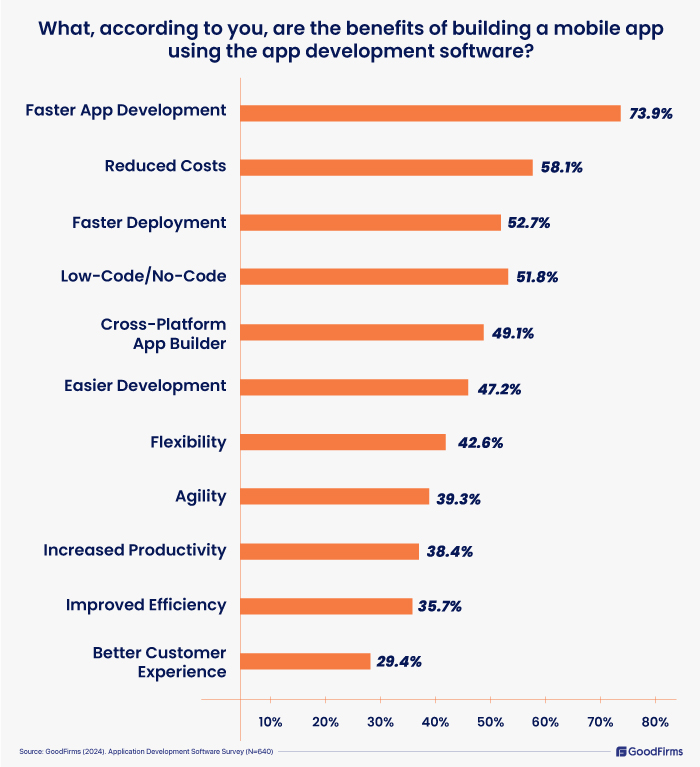
#1 Faster App Development
Faster app development is a major benefit of using app development software, said 73.9% of the survey responders.
Faster development is just one of the many benefits of using an app builder to develop a mobile application. With the intuitive drag-and-drop interface, application development platforms speed up the development process. When compared to the traditional method of building an app from scratch by writing code, low-code development is ten times faster.(5)
Datazo Infotech mentioned, “In an era where mobile apps have become the cornerstone of digital interaction, the need for rapid, secure, and high-quality development has never been greater. As businesses strive to meet consumer demands for flawless user experiences, the spotlight is increasingly falling on automation as a game-changing solution.”
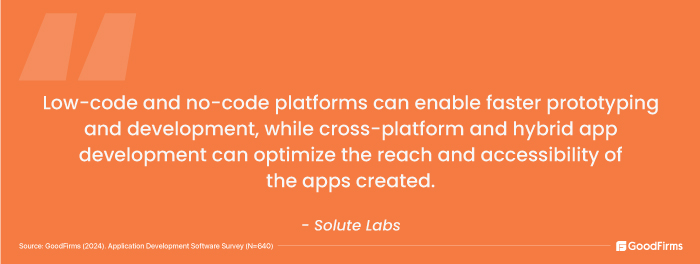
Faster development processes result in shorter time-to-market, which, in turn, is a crucial factor in staying ahead in a competitive market.
#2 Reduced Costs
The use of app development software results in reduced costs, said 58.1% of the survey respondents.
Hiring skilled professional developers to build an enterprise custom application can be pricey. Maintaining a legacy system by hiring more developers can further put a huge financial burden on the business.
“The low-code or no-code approach allows for saving time and money on development and allows businesses that are not sure of the need for apps or websites to trying before starting a real development project,” said UKAD.
Empat said, “New app development technologies will appear that will reduce the cost of the process and make it easier for non-technical people.”
By employing low-code/no-code application development platforms, businesses can surely reduce some costs. They enable even non-developers to easily build mobile applications diminishing the need for trained professionals. Also, the reduced need for maintenance of the applications further adds to the cost savings.
#3 Faster Deployment
The use of app development software can help in faster deployment, according to 52.7% of the surveyed businesses.
Most no-code development software is characterized by single-click deployment processes. While the development of an app is easy with application development software, the testing process is more convenient.
With the bug-free approach, there is little possibility of the requirement to fix any bugs in the developed application. This reduces the time required to deploy an enterprise application.
“We expect many software development tools will integrate AI to enhance and accelerate the development process. We are entering an age where coder and non-coders alike can realize their ideas faster than ever before,” according to SEO Vendor.
With the availability of integration options with third-party vendors through APIs, the deployment becomes even more easy and convenient.
Timspark mentioned, “Low-code and no-code tools enable faster development cycles and help developers, even with basic technical knowledge, get involved.”
#4 Low-code/No-code
One of the top benefits of using app development software is the introduction of low-code/no-code, according to 51.8% of the survey respondents.
Low-code and no-code are crucial benefits provided by an app development platform. With larger organizations opting for app builders, low-code/ no-code software solutions have gained traction.
“The future of app development software will revolve around a nuanced debate between low-code platforms and traditional development methods, catering to users who seek either rapid deployment with minimal coding or intricate customization and control for fully detailed applications,” mentioned ScaleupAlly.
According to Gartner, by 2025, about 70% of application development activity will be carried out by low-code/no-code platforms.(6) The availability of these platforms is responsible for the rise in citizen developers.
Yalantis asserted, “No-code/Low-code brings simplified app development with the possibility of citizen development and wider availability.”
#5 Cross-Platform App Builder
According to 49.1% of the surveyees, app development software is beneficial in cross-platform app building
The availability of cross-platform app builders is an asset for organizations that do not want the operating systems of mobile devices to become a barrier. Owing to the fact that most mobile app builders follow an approach for cross-platform development, it becomes easier to create apps that can be deployed easily and fast.
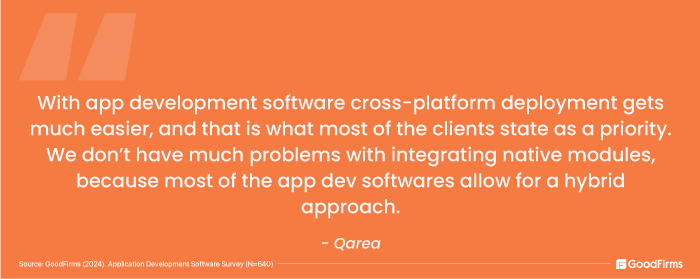
“Cross-platform tools will continue to gain popularity, allowing the creation of apps that work across multiple devices,” said Effeect.
The single-click deployment option allows the building app to be compatible with various platforms.
#6 Easier Development
Easier development is another benefit of app development software, said 47.2% of the survey participants.
With the pre-built templates and components, app development has become an easy process. The efforts required for app development from scratch are way more when creating one with the drag-and-drop functionality of the low-code/no-code app development platform.
“This not only makes app development faster than ever before but also brings down the barriers that used to make tech seem off limits,” said Hum JAM
“With AI, app development will be more and more user-friendly and scalable,” mentioned Crypton Studio.
Although low-code app development platforms require a certain amount of coding knowledge, the process is much simpler when compared to writing lines of code for the entire application functionalities. With the assistance of AI technology, the process becomes even more easy.
#7 Flexibility
Flexibility is another benefit of using app development software for app development, according to 42.6% of businesses.
App development solutions are the most efficient tools that can create complex applications in shorter times. Unlike humans, these platforms can produce results consistently and with the same efficiency.
Being powered by technologies like AI, the apps produced by no-code/low-code platforms are error-free. This brings flexibility for businesses to utilize the saved time for more critical tasks.
“Similar to how cross-platform development allowed developers to create apps for multiple platforms with a single codebase, new tools like low-code and no-code platforms have the potential to expand development options, add a layer of efficiency, and make app creation more accessible,” according to Wolfpack Digital.
Binary Future said, “App development platforms are involving - getting more flexible and easy to use for anyone.”
Employing these software solutions allows flexibility for businesses to quickly adapt to customer requirements.
#8 Agility
About 39.3% of surveyed businesses mentioned that app development platforms are beneficial for getting agile solutions.
With app development software, especially low-code solutions, even the smallest of the workflows become agile. With the democratization of data and improved collaboration within the departments and across organizations, agility can be established.
“Low-code/no-code approaches, empowering both developers and non-technical users to create sophisticated applications rapidly and efficiently. These platforms will prioritize collaboration, scalability, and adaptability to meet the evolving demands of modern software development ecosystems,” said Acropolium.
With the ability to integrate with the cloud and other third-party platforms, agile solutions can be made available. The development of incredible applications and gaining customer feedback on the same can further help businesses work on improving the agility of the solutions.
#9 Increased Productivity
Around 38.4% of the survey participants believe that the use of app development software increases productivity.
Low-code/ no-code app development platforms, have made creating apps accessible to even non-coders. With these platforms, the development time has been dramatically reduced, leaving developers with more time to work on other critical tasks.
Reenbit said, “The role of AI & ML & Automation will be significant. It's all about making good use of knowledge gained over the last decades and improving developers' productivity, the issue that all companies have been trying to resolve for years.”
Low-code application development software solutions help streamline workflows and allow better collaboration within the organization to accelerate the development process and reduce technical debt. The less time required to build the app can help businesses improve their business processes and focus on areas where expertise is required, thus improving productivity.
“By automating various steps such as software testing, deployment, or maintenance with the help of CI/CD pipelines, test automation frameworks, and code generation tools, teams can significantly increase test coverage, minimize the risk of a human factor, release failsafe software faster, and even reduce development costs,” said a1qa.
#10 Improved Efficiency
Around 35.7% of the surveyees believe the use of app development software improves efficiency.
Low-code app development platforms are extremely capable of saving organizations time. To be precise, they can save up to 50-90% of the development time that coding can take.(7)
The time saved in the development processes can be used by the organization to focus on the core business processes. Improving the overall efficiency.
“In the future, expect automated code generation, intelligent debugging, and personalized recommendations that boost developer productivity and streamline workflows.” said Aveshost.
According to Sunflower Lab, “App development is a game changer in Custom software development. It will increase efficiency and easily put ideas into reality in a short amount of time.”
“Integration of low-code and no-code platforms will empower non-technical users to create applications, fostering collaboration between developers and other stakeholders,” said Copper Digital.
When coupled with AI and machine learning, the development process can be further automated to improve efficiency.
#11 Better Customer Experience
Using app development software for app development can improve customer experience, said 29.4% of the survey respondents.
The introduction of app development software has made it easy for businesses to provide users with the ease of connecting with the brand in no time. An enterprise application is one of the many ways that customers have to interact with a brand. The reduced time-to-market is one aspect of an enhanced customer experience.
“Cross-platform development ensures seamless operation across devices. Cloud-based environments offer scalability and collaboration. User experience takes center stage, with a focus on intuitive design,” said EZ Rankings.
Also, the fact that no-code platforms use a drag-and-drop interface allows developers to build a user-friendly UI that can make a better user experience. Also, making changes to an application built with software is easier and faster, making it possible to respond to customer feedback in no time.
What are the Key Challenges of Using App Development Software?
While app development platforms offer a plethora of benefits for businesses, IT teams, and application users, there are several challenges that businesses can face when using the software.
This article discusses the most common challenges businesses face when employing app development software.
Ace Infoway said, “They play a vital role but fall short in terms of customization, security, and scalability, unable to entirely replace traditional methods or meet the demand for skilled developers.”
“Factors like personalization, security, efficiency, and seamless experiences. Crucial for the future,” said Intermedia IT.
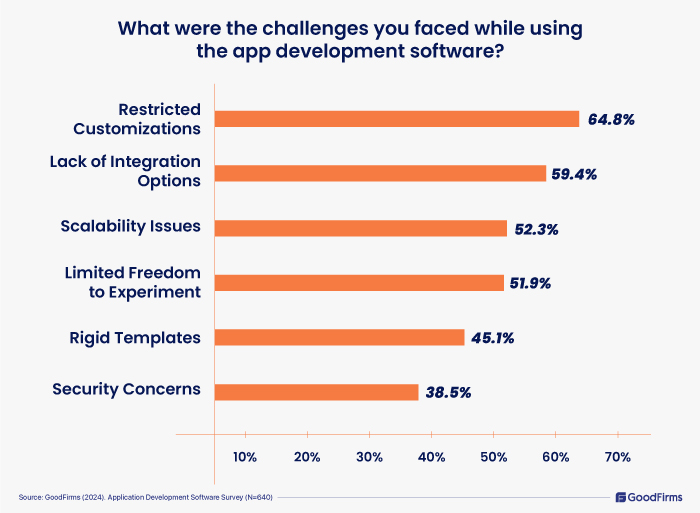
#1 Security Concerns
According to 38.5% of the survey responders, security concerns stand as a major challenge with app development platforms.
Data security and privacy remain one of the major concerns when using a low-code/no-code app development tool. Platforms must make sure that the application development using a tool is compliant with the data security requirement.
“As cybersecurity threats evolve, app development tools may incorporate more built-in security features. This could include tools for code analysis, vulnerability scanning, and encryption to help developers create more secure applications,” mentioned Startbit IT solutions.
Controlled access and built-in encryption can help improve the data security of mobile apps.
Blockchain facilitates the development of decentralized applications, offering enhanced security, transparency, and immutability of data. The use of modern technologies like blockchain will play a crucial role in making the transactions done on enterprise applications safe and secure.
#2 Restricted Customizations
Restricted customizations stand as a top challenge when using app development software, according to 64.8% of the surveyees.
Most business applications have some unique requirements. App development software solutions come with pre-built components that help build the application faster. However, this limits the capability to customize the app to the requirements of the business.
Cosmico Studios mentioned, “No-code/Low-code development platforms offer an excellent way to experiment and launch your app, but they can become challenging when you want to add more customized features.”
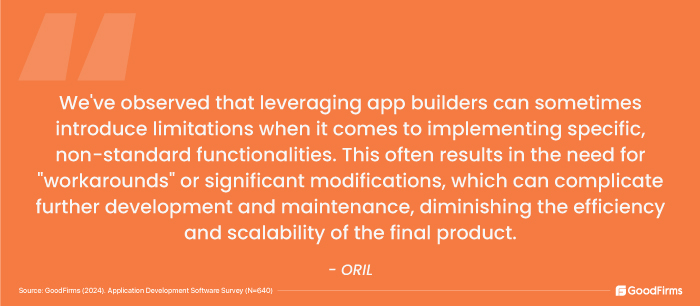
It is necessary to have scope for customization in a no-code, low-code app development platform to give access to businesses to curate applications that can fit the company's expectations.
#3 Limited Freedom to Experiment
The use of app development software results in limited freedom to experiment, said 51.9% of the survey participants.
Once an application is built with a particular low-code/no-code platform, developers might feel the need to migrate to a different platform with different features. However, issues like vendor lock-in can be a hurdle for businesses when trying to experiment with the features.
“Small businesses and individuals can use no-code app development software to enter the market easily and inexpensively, although these solutions may lack customization, scalability, and room for experimentation,” said Codment.
The freedom to experiment can lead to a lack of flexibility and restrict the ability of the app to use certain technologies to enhance the app's performance.
#4 Rigid Templates
Rigid templates are a challenge with app development software, according to 45.1% of the survey participants.
App development platforms are designed to have pre-designed templates and components to ease the development process. However, the same templates can limit the developers from building an app tailored to the requirements. Sometimes the logic used for a pre-defined template cannot accommodate the logic required for the planned application.
“App development platform needs to become a "template" factory with unlimited customization abilities,” suggested COAX Software.
The rigidity of the templates and components can, therefore, become a challenge for businesses when creating an enterprise application with the available options, leading to opting for custom application development altogether.
#5 Lack of Integration Options
Lack of integration options is a major challenge for app development software, said 59.4% of the surveyees.
For the efficient use of an app builder, it is necessary that the platform seamlessly integrates with the legacy systems and all the existing databases for the digital environment of the business. However, integration of all the third-party platforms and databases can result in huge challenges for the business.
A lack of integration options can result in data silos across the organization which can lead to a failed attempt to provide a great customer experience. It is, therefore, necessary that the low-code or no-code app development software provides integration options that help with keeping the third-party services and legacy systems on the same page.
#6 Scalability Issues
About 52.3% of the surveyed businesses faced scalability issues when using app development software solutions.
With the growth of a business, the business application is expected to upscale as well. However, the scalability of the application might become a concern if the low-code app development platform resists the scalability.
With the growth in complexity and the rise in the demand for efficient apps, users can restrict their usage due to scalability concerns. In such cases, the combination of custom application development with the app development software might be required to suffice the requirement.
“App development software will be more and more used going forward, especially for MVPs, simple function apps, and well-established types of business apps (e.g. e-commerce apps). Still, particular skills and experienced software development agencies will be key for more complex and customized apps,” said Atta Systems.
Brave Zebra mentioned, “About the future of "no-code app development software" I think they have a future, but will rarely surpass the efficiency of a software engineering team. It might be useful for fast prototyping and certain use cases, but never for a professional app.”
To tackle such scalability issues, accurate analytics and predictions might help in planning according to future requirements.
Key Points to Follow to Transform the Business Ideas Into Application:
There are several reasons that can lead to businesses opting for app development software solutions for developing applications. Goodfirms surveyed the reasons why businesses chose app development platforms for building their business apps and got various responses.
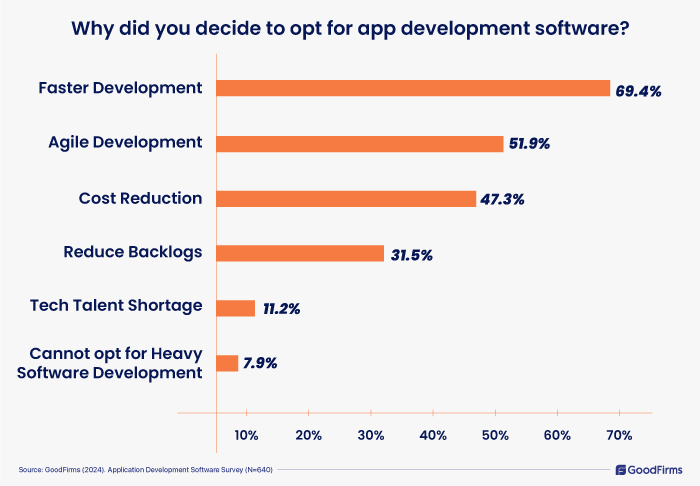
The most common reason that made businesses opt for app development software is the ability of the solutions to expedite the development process. About 69.4% of the businesses agreed that the faster app development process facilitated by the software solutions is a major reason for choosing app development software.
While agile development is the reason why 51.9% of businesses opt for app development software, nearly 47.3% of the survey participants chose app development platforms because of the cost reduction that these platforms offer.
About 31.5% of the surveyed businesses decided to opt for app development software solutions in order to reduce their backlogs. In contrast, tech talent shortage made 11.2% of the survey respondents opt for app development platforms to build their business applications. Less than 8% of the surveyees said that they could not opt for heavy software development and so chose an app development software to create their enterprise application.
A few Statements from our Research Partners on App Development Software Utility:

When queried about the challenges they faced when using app development software, 62.7% of the survey respondents indicated that the low-code, no-code platforms lack features due to rigid templates.

When queried about the ease of development, around 31.8% of the surveyed businesses said that the use of app development software solutions has led to a rise in citizen developers.

About 48.1% of the surveyees asserted that developing mobile applications with software is much quicker and cheaper.

The drag-and-drop interface supported by low-code platforms makes app development easier for even non-coders, said 67.2% of the survey participants.

About 59.3% of the survey participants believe that the use of app development software solutions has reduced the involvement of software developers in tedious coding work.
Future of App Development Software
App development software has gained tremendous popularity in recent years. The use of these software solutions increased manifold after the pandemic era. Due to the ease of use and faster time-to-market, the trend of using app development software is here to stay.
The integration of the low-code app development platforms and no-code app development platforms with evolving technologies has led to advancements and improved efficiency of the application development software.
When surveyed about the role of various modern technologies in the app development platforms, businesses came up with several outputs. Some of which are mentioned here:
Unified Infotech suggested, “Automation has already gained in popularity. Many companies have automated their workflows using custom apps developed based on their exclusive needs. This trend will continue to evolve. New technologies will further enhance the utility and applicability of your app.”
“Modern technology can help in Harmonious synthesis in one app development software with combined intelligence, personalization, and efficiency,” said Smartym Pro.
“The involvement of modern technologies will enable developers to create more innovative, efficient, and secure apps,” said VT Labs.
“Modern technologies will develop a more complex system that propels the development of a new application ecosystem,” said Musato Technologies.
“Automation of apps based in intelligent environments, with projection capabilities and more accurate business needs, reducing risks, costs, and challenges,” said Stateside Agency.
#1 Artificial Intelligence and Machine Learning
Artificial intelligence is a technology that has impacted the technological landscape. With AI, application-making software solutions can further automate the development processes, improving the speed.
AI can also help enhance the scalability of the platforms and improve efficiency.
Artificial intelligence can not only help improve the performance of low-code/no-code platforms but also help in predictive analytics to plan for future requirements.
“AI/ML technologies and Automation will be major contributors and will influence the direction in which the industry will go in the next,” said Foreignerds.
Cannibals Media stated, “In the app development arena, AI and ML will drive personalized user experiences, intelligent automation, and predictive analytics. Automation will streamline development processes, reducing manual efforts and errors. Together, these technologies will revolutionize app development, leading to more intelligent, efficient, and secure applications, catering to the evolving demands of users and businesses.”
“The future is user-generated apps using artificial intelligence, where the user explains the features of the app to an AI assistant, and the AI assistant will guide the user by asking multiple questions to determine the complexity of the app and then produce the core of the app using multiple tools,” predicted Digilite.
Fora Soft said, “AI will help the developers more and more, speeding up development.”
BlueLabel said, “User-friendly analytics and feedback mechanisms will be integrated into development software, enabling creators to gain actionable insights into user behaviors and preferences. This will facilitate the continual improvement of the app’s user experience.”
“ML algorithms can analyze large datasets to derive meaningful insights, enabling apps to offer personalized recommendations, optimize user engagement strategies, and improve overall app performance through continuous learning and adaptation,” stated Visiontech Systems International LLC.
“Machine learning will be employed for personalization, predictive analytics, and optimizing app performance based on user behavior and feedback,” said Incora.
#2 Augmented Reality and Virtual Reality
With the help of AR/VR, people without coding skills will be able to create immersive experiences and interactive applications.
“Technologies like AR and VR will revolutionize the entire mobile app development process,” said Strivemindz.
“As augmented reality (AR) and virtual reality (VR) technologies become more mainstream, app development software will incorporate tools and resources to facilitate the creation of immersive AR/VR experiences,” asserted axiusSoftware.
#3 Blockchain
The integration of blockchain and low-code, no-code platforms is a great initiative to improve the security of the application.
“Blockchain can facilitate the creation of decentralized apps (dApps) that are not controlled by any single entity, potentially increasing user privacy and trust,” said Empex Digital.
Technoloader said, “App developers can leverage smart contracts for secure and automated execution of predefined agreements, reducing the need for intermediaries in various processes.”
“Blockchain integration for enhanced security, more collaborative development environments, advanced DevOps and CI/CD integration, user experience-centric tools, and the rise of edge AI capabilities are among the trends shaping the future landscape of app development software,” mentioned Uran Company.
#4 5G
The introduction to 5G has promoted development in the tech sector. With the rise in the use of 5G, development processes will gain pace.
Influocial Technologies said, “The advent of 5G will lead to faster and more reliable connections, enabling richer app experiences.”
“The advent of 5G revolutionizes app performance, enabling high-speed connectivity for data-intensive applications,” said Softude Infotech.
How Much Does it Cost to Develop an App With App Development Software?
App development software solutions offer a simplified way to create apps without the need for extensive coding. The minimal need for coding significantly reduces the cost involved in the development process. However, it is necessary to understand the complete cost structure.
Different app development software have different pricing structures. A few platforms offer free plans, while others cost you based on the usage or functionalities.
Overall, the cost of developing an application with app development software can vary depending on the complexity of the project. If your proposed application is simple with minimal functionalities that align with your business size, then the cost will be less than one with multiple functionalities, automation, complex features, customization, and integrations. The cost includes the platform fees, developer fees, hosting fees, and maintenance fees. You can pick up the templates and pay accordingly, or order a feature specially customized for you and pay for that. Roughly, the cost to develop an application with app development software can be from $0 - $20,000, depending upon the complexity.
When considering a low-code, no-code platform for app development, businesses need to take into account the pricing models for the software.
Although many vendors offer a free trial version of the software, there are various software pricing models based on the features and the complexities of your app development project. Here are a few pricing models that will help you to understand the methodology of app development cost.
Subscription-based: The model incurs a fixed cost recurring after a fixed time period, mostly monthly or annually.
Per User/Per App Pricing: This strategy is mostly suited for businesses looking for pricing control. The model charges a fixed amount based on the number of users of the software or the number of applications built using the software.
Usage-Based Pricing: Usage-based pricing is determined by resource usage, such as storage or data transfer. This model is effective for firms where the requirements keep on changing.
Enterprise Licensing: Larger organizations opt for enterprise licensing, which allows them to get a customized agreement based on their requirements. These agreements can be a combination of fixed fees, usage-based charges, or other models based on the business's requirements.
The total cost of ownership of app development software comprises a few elements, such as initial investment, licensing or subscription fees, development costs, deployment costs, training, and support.
The costs of developing an app can vary based on a number of factors and the pricing model of the selected software. The cost of developing an app using app development software can further increase if a professional developer is hired.
Key Findings:
-
About 62.6% of the surveyed businesses have utilized an application development platform to develop an application.
-
61.9% of the survey participants believe that when selecting an app development software, the possible customizations with the software must be considered.
-
31.8% of the surveyed businesses said that the use of app development software solutions has led to a rise in citizen developers.
-
About 48.1% of the surveyees asserted that developing mobile applications with software is much quicker and cheaper.
-
App development software solutions have reduced the involvement of developers in tedious coding tasks, improving efficiency, according to 59.3% of the surveyees.
-
Faster app development is a major benefit of using app development software, said 73.9% of the survey responders.
-
About 39.3% of surveyed businesses mentioned that app development platforms are beneficial for getting agile solutions.
-
For 58.1% of the survey responders, app development software has resulted in reduced costs for app development.
Conclusion
App development software solutions have emerged as an innovative change that has made a difference in the digital landscape. With the rising popularity of low-code/no-code platforms, the speed of application development has increased while reducing the cost involved.
“The app developers can easily do away with the challenges the developers face today, like decoding the complexities of AI, heavy dependence on traditional coding, and the limitation of secured and fast networks,” mentioned Cyntexa Labs.
By harnessing the power of these platforms, businesses can improve efficiency and productivity while delivering an immersive customer experience. App development platforms are a great option for improving collaboration across organizations and getting non-technical people involved in the application development process. Although the utilization of these tools comes with its own set of challenges, integrating modern technologies can lead to a promising future for the industry.
We sincerely thank our Research Partners for their valuable insights.
References
-
https://www.statista.com/outlook/tmo/software/application-development-software/worldwide
-
https://www.veracode.com/sites/default/files/pdf/resources/reports/veracode-state-of-software-security-2023-public-sector.pdf
-
https://www.goodfirms.co/app-development-software/blog/best-free-and-open-source-app-development-software-solutions
-
https://www.marketsandmarkets.com/Market-Reports/low-code-development-platforms-market-103455110.html
-
https://www.forrester.com/blogs/why-you-need-to-know-about-low-code-even-if-youre-not-responsible-for-software-delivery/
-
https://www.gartner.com/en/newsroom/press-releases/2021-11-10-gartner-says-cloud-will-be-the-centerpiece-of-new-digital-experiences
-
https://www.redhat.com/rhdc/managed-files/mi-451-research-intelligent-process-automation-analyst-paper-f11434-201802.pdf
Research Partners’ List
Table of contents
- Introduction
- Overview of the App Development Software Market
- Survey Data Analysis
- What Factors to Consider When Selecting the App Development Software?
- What are the Key Benefits of App Development Software?
- What are the Key Challenges of Using App Development Software?
- Key Points to Follow to Transform the Business Ideas Into Application:
- A few Statements from our Research Partners on App Development Software Utility:
- Future of App Development Software
- How Much Does it Cost to Develop an App With App Development Software?
- Key Findings:
- Conclusion
- References







